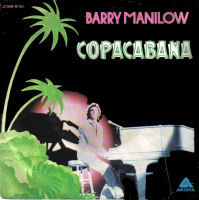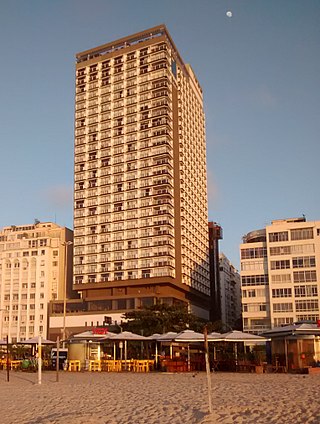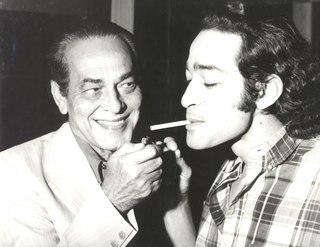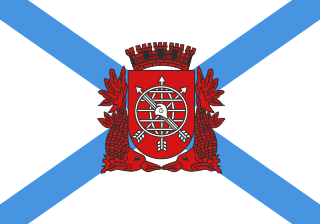
Copacabana is a bairro (neighbourhood) located in the South Zone of the city of Rio de Janeiro, Brazil. It is most prominently known for its 4 km (2.5 miles) balneario beach, which is one of the most famous in the world.

"Copacabana", also known as "Copacabana (At the Copa)", is a song recorded by Barry Manilow. Written by Manilow, Jack Feldman, and Bruce Sussman, it was released in 1978 as the third single from Manilow's fifth studio album, Even Now (1978).
Copacabana most commonly refers to:

Carina Schlichting Beduschi is a Brazilian actress, TV host, architect, model and beauty queen who represented Brazil at the Miss Universe 2005.

The Leading Hotels of the World, Ltd. (LHW) is a marketing organization, representing more than 400 hotels in over 80 countries. Established in 1928 by European hoteliers, LHW is headquartered in New York City.

Leme is an upper-middle-class neighborhood in the South Zone of the City of Rio de Janeiro, Brazil, next to Copacabana, Urca and Botafogo. The neighborhood takes its name from a nearby rock formation whose shape resembles the rudder of a ship.

The 1995 Beach Soccer World Championships was the first edition of the Beach Soccer World Championships, the most prestigious competition in international beach soccer contested by men's national teams until 2005, when the competition was then replaced by the second iteration of a world cup in beach soccer, the better known FIFA Beach Soccer World Cup. It was organised by Brazilian sports agency Koch Tavares.

The South Zone is an area of the city of Rio de Janeiro situated between the Tijuca Massif, the Atlantic Ocean and Guanabara Bay. Most of it is made up of neighborhoods along the Atlantic coastline, such as São Conrado, Vidigal, Leblon, Ipanema, Copacabana, and Leme.

Hilton Rio de Janeiro Copacabana is a 110-metre 37-storey skyscraper hotel in the Leme neighbourhood of Rio de Janeiro, Brazil. It is the tallest building on Leme Beach.

Rio Othon Palace is a highrise hotel located on Copacabana Beach in Rio de Janeiro, Brazil.
Copacabana Hotel Residência is a hotel in Copacabana, Rio de Janeiro, Brazil, located at Rua Barata Ribeiro 222. It contains apartments which have self-service facilities, 120 suites in total.
The Hotel Atlantico Praia, formerly the Ouro Verde Hotel, is a small hotel in Copacabana, Rio de Janeiro, Brazil. At one time the Ouro Verde was considered one of the world's best small hotels, and the restaurant had a high reputation. Over time it lost some of its lustre, but it has recently been renovated.

Avenida Atlântica is a major seaside avenue in Rio de Janeiro, Brazil. It is 4 kilometers long, and spans the entire length of the neighbourhoods of Copacabana and Leme.
Copacabana Airport is an extremely high elevation airport serving Copacabana, a town on Lake Titicaca in the La Paz Department of Bolivia.

Copacabana Palace, is a hotel in the city of Rio de Janeiro, Brazil, facing Copacabana beach. Designed by French architect Joseph Gire, it was built in a style that follows the line and model of the great beach hotels of the nineteenth and early twentieth centuries, and opened on August 13, 1923.

Pelópidas Guimarães Brandão Gracindo, known as Paulo Gracindo, was a Brazilian actor.

Copacabana Palace is an Italian comedy film from 1962, directed by Steno, written by Luciano Vincenzoni, starring Walter Chiari, Mylène Demongeot and Franco Fabrizi.

Pega Pega is a Brazilian telenovela created by Claudia Souto, produced and broadcast by TV Globo. It is directed by Luiz Henrique Rios. It premiered on 6 June 2017 replacing Rock Story and ended its run on 8 January 2018, with Deus Salve o Rei replacing it.

The following outline is provided as an overview of and topical guide to Rio de Janeiro:
















